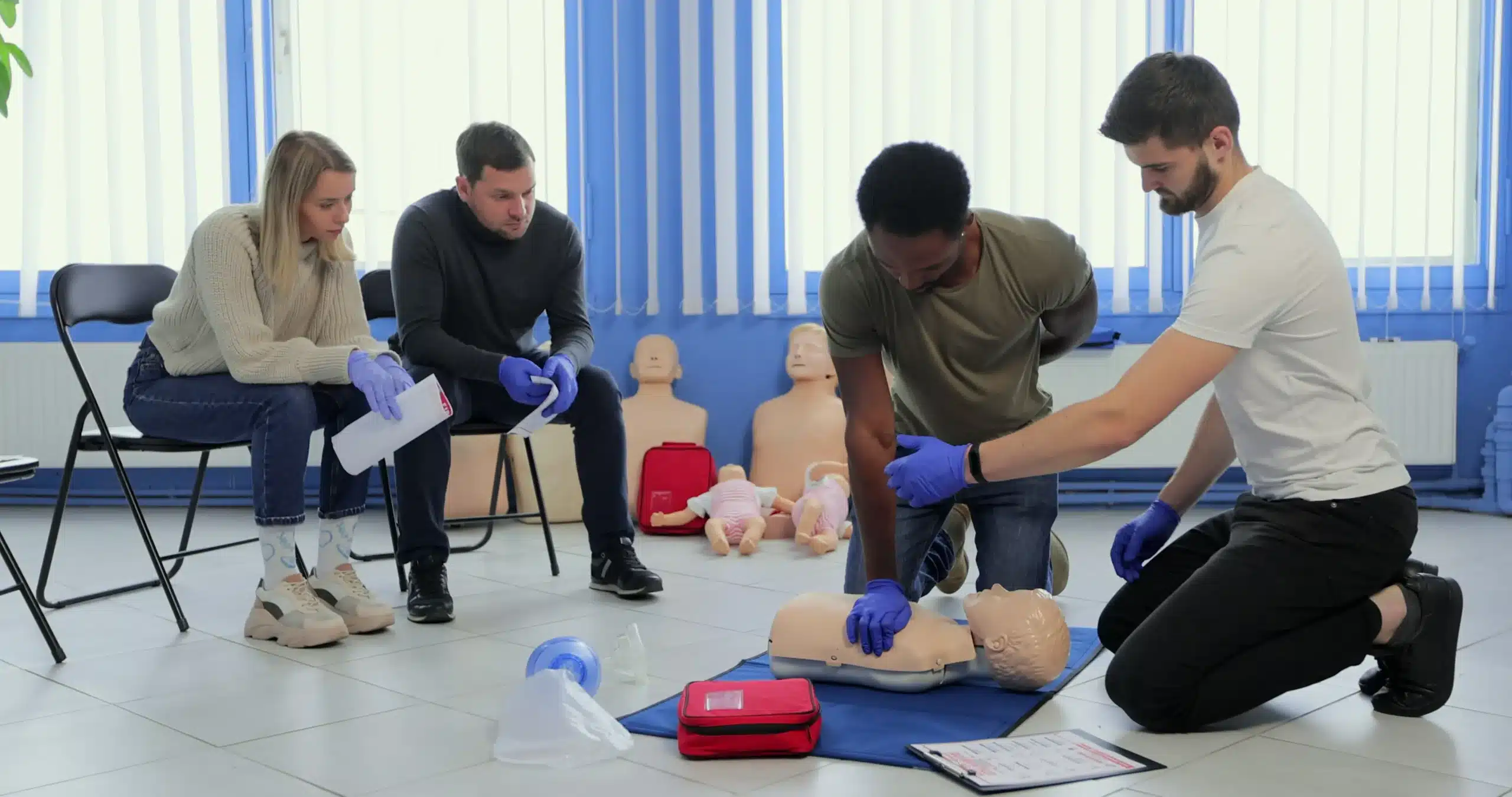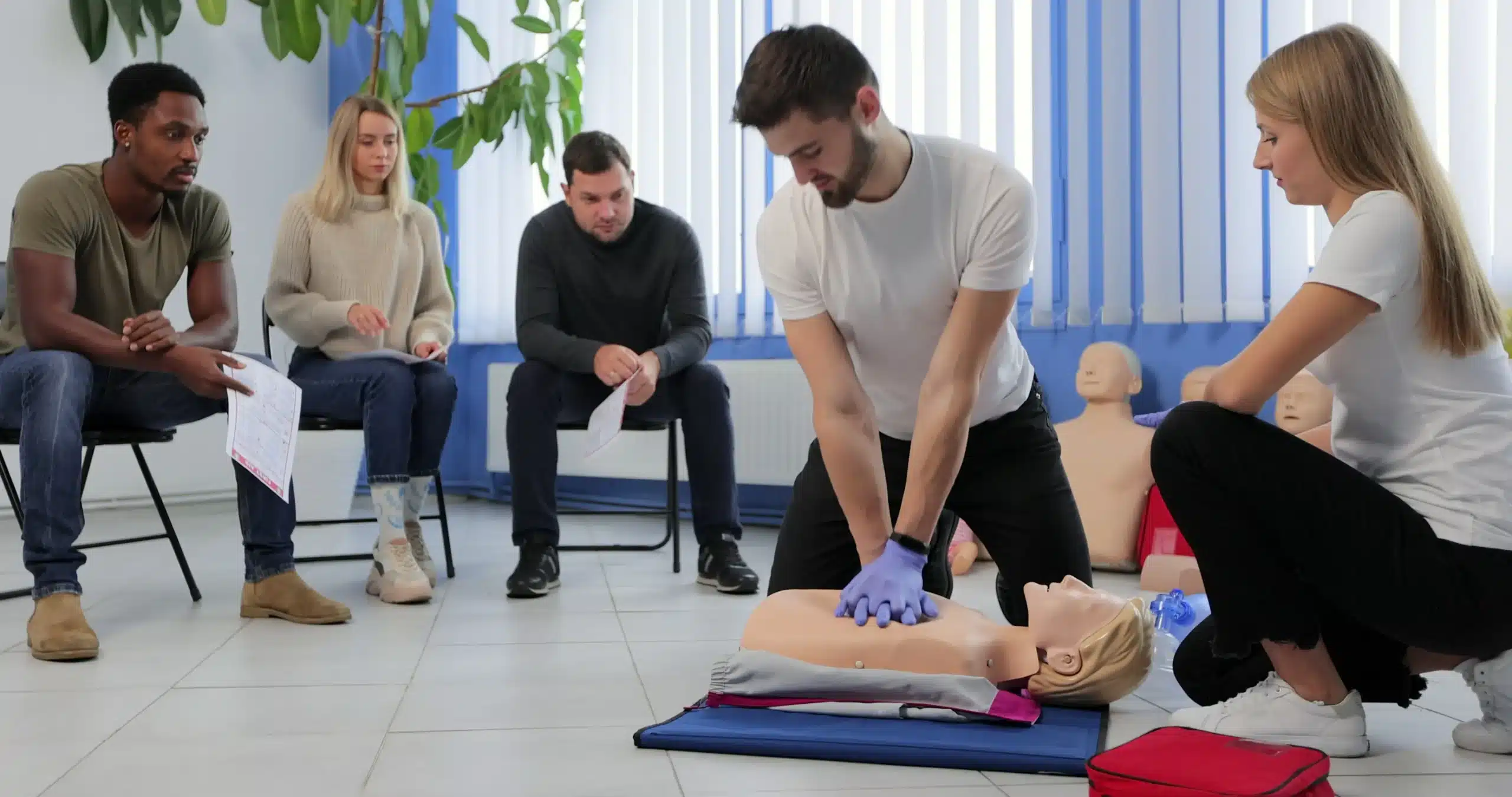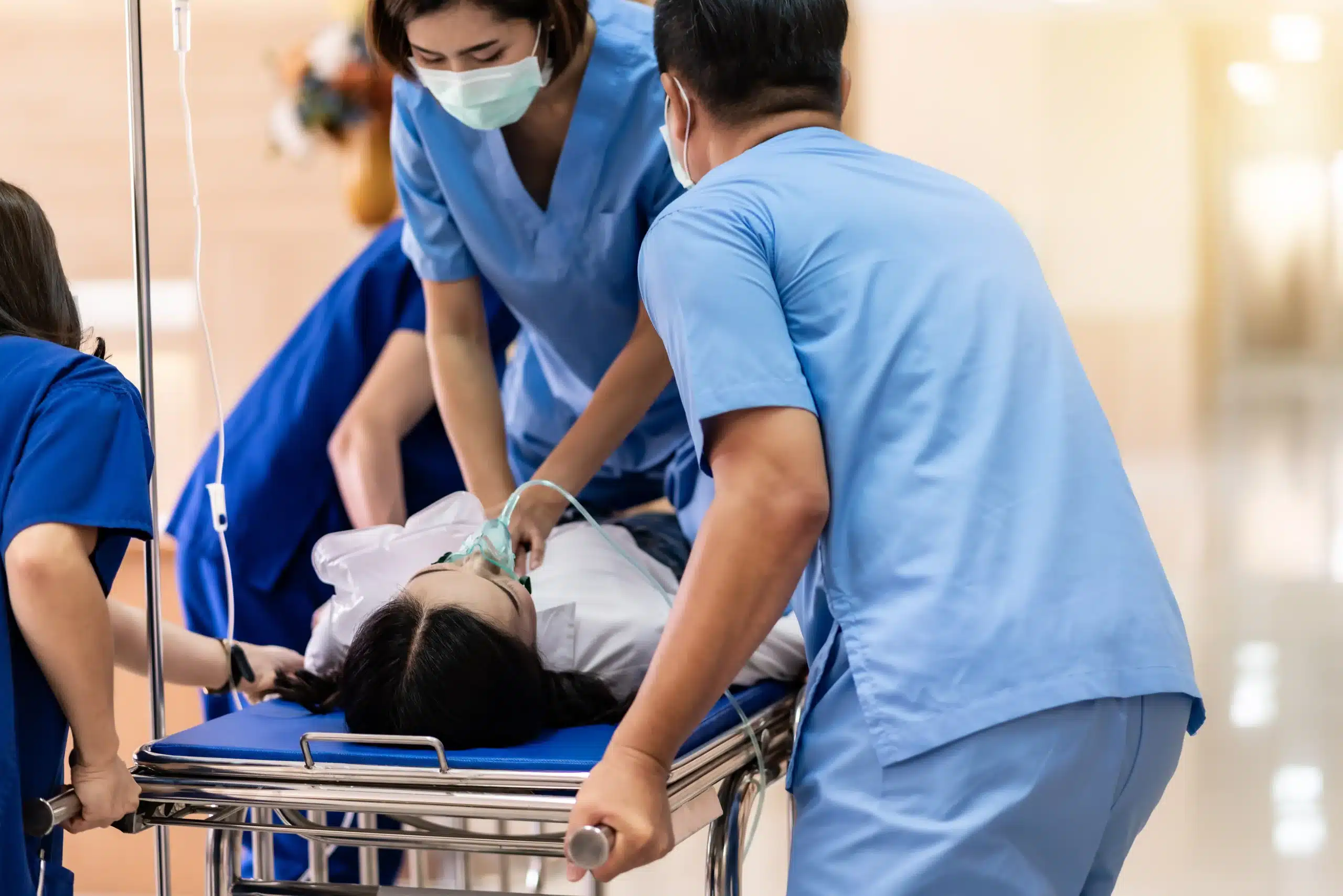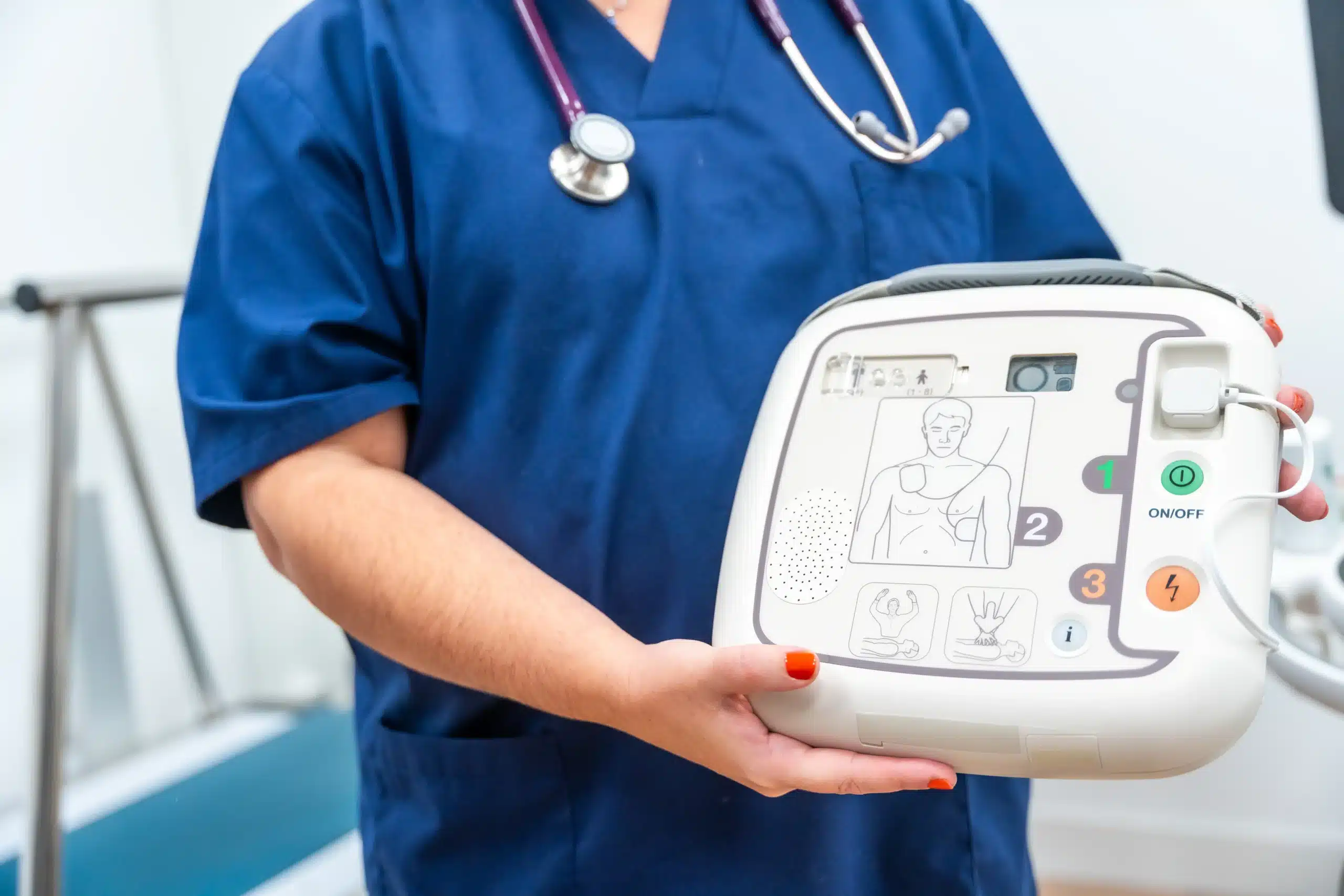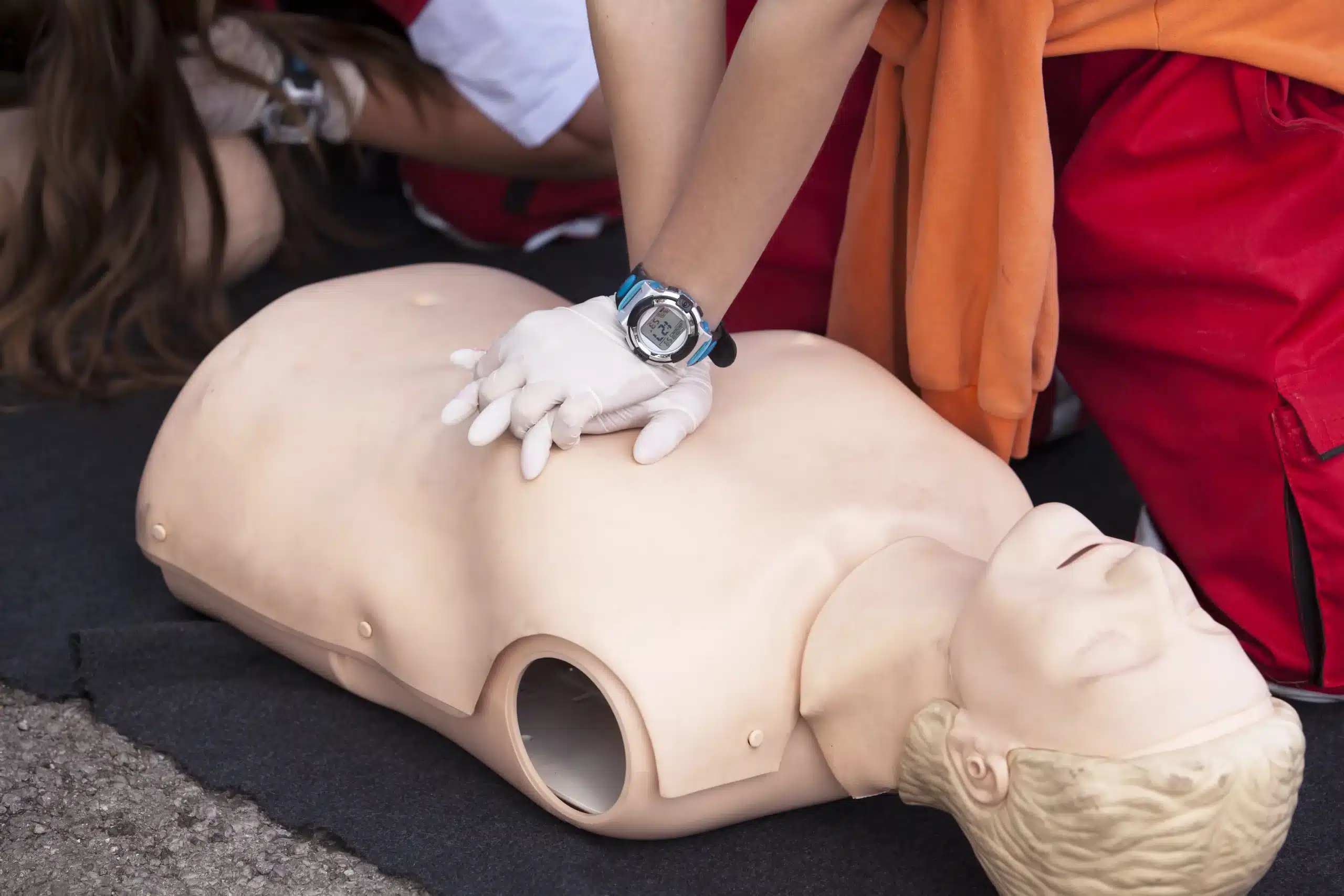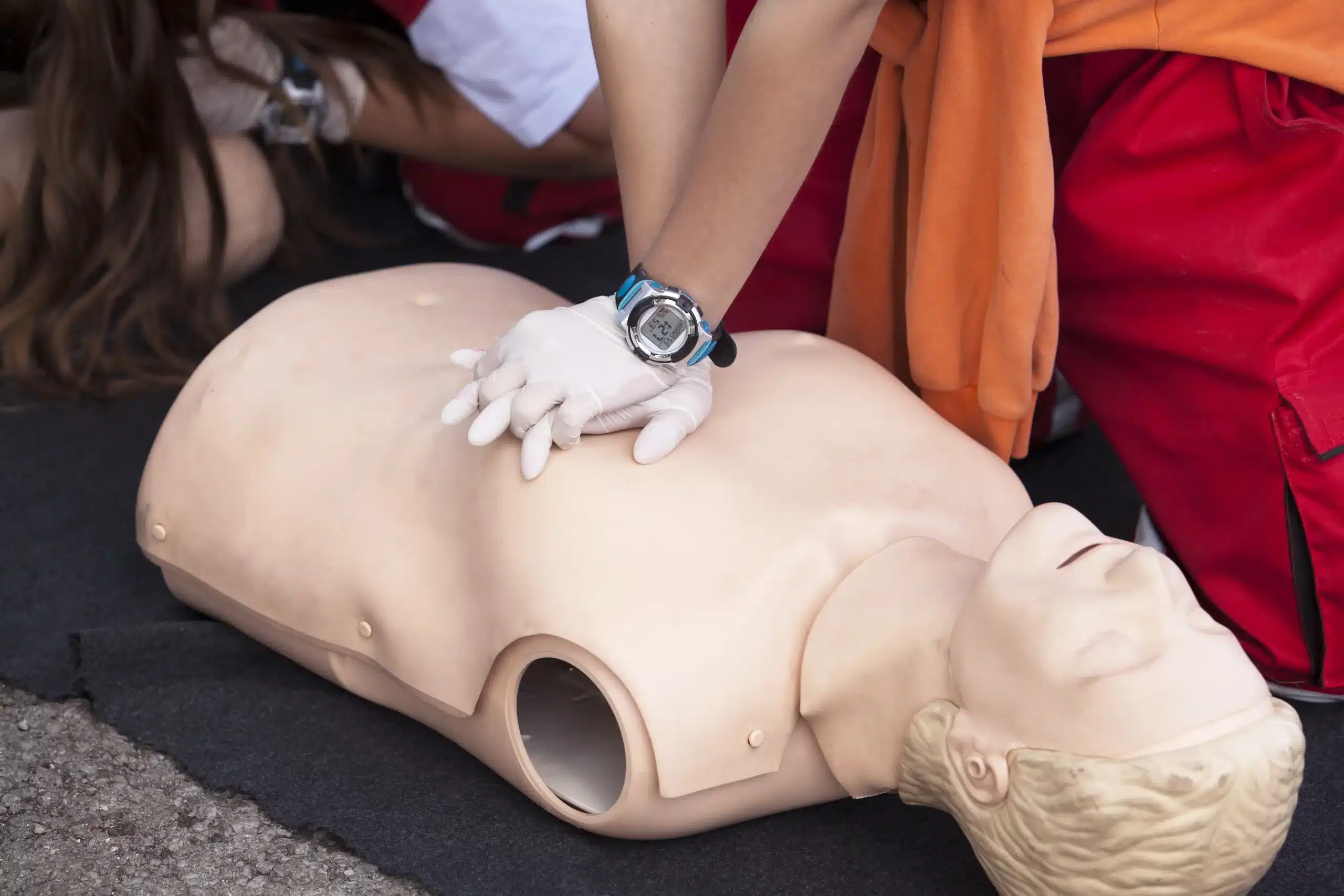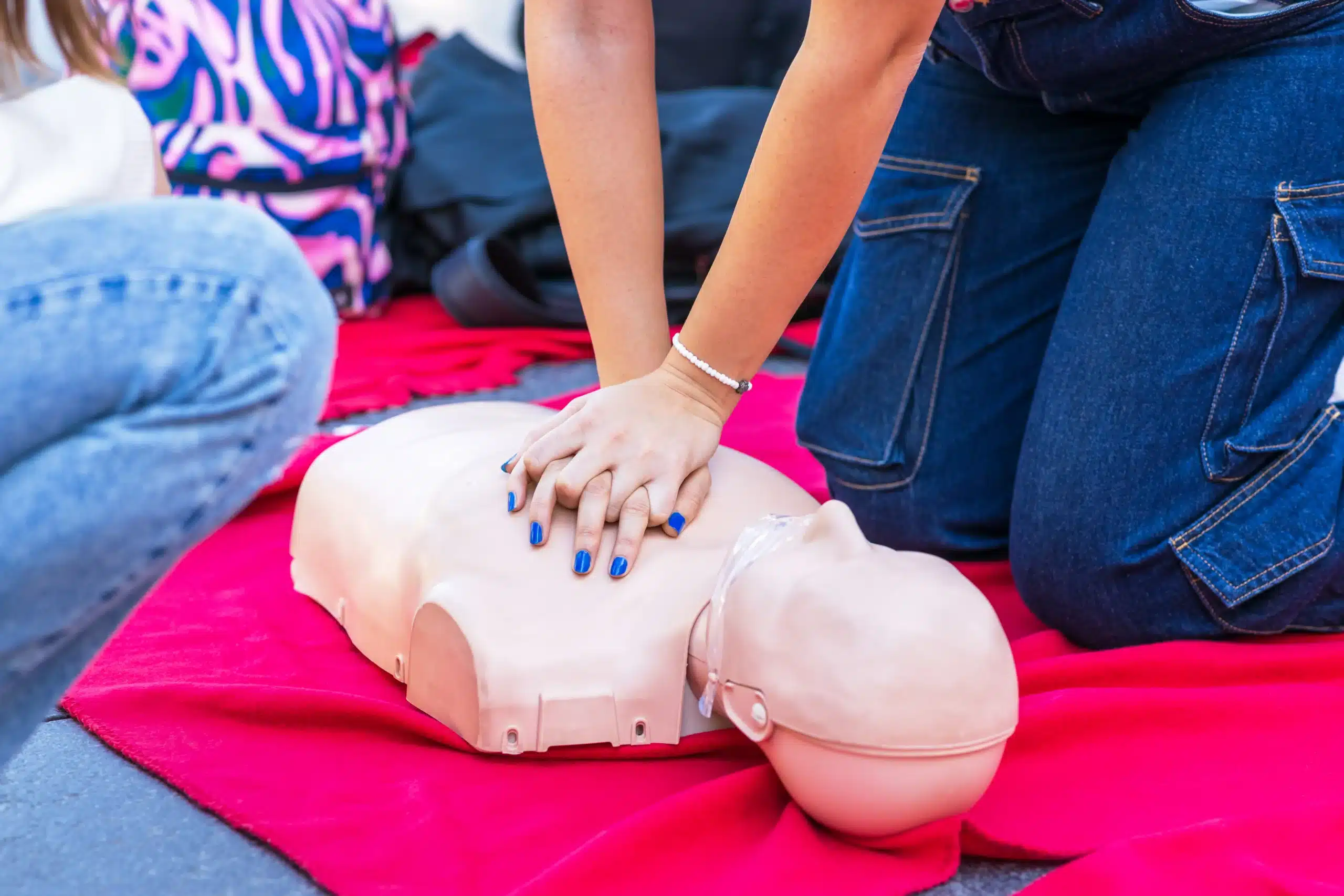Life is unpredictable, but you can prepare for the unexpected. CPR training gives you the skills and confidence to respond effectively in medical emergencies. This guide is your comprehensive resource for CPR training in Millbrae. We’ll cover everything from finding the right course to understanding the certification process. We’ll explore different CPR certifications, discuss costs and training options, and debunk common myths about CPR. We’ll also provide practical tips to help you prepare for your class and make the most of your training experience.
Key Takeaways
- CPR certification equips you to handle emergencies: From basic CPR and first aid to advanced life support, find a course that aligns with your individual or professional goals. Hands-on practice builds the confidence to act quickly and effectively when it matters most.
- Daly City CPR Classes offers convenient and affordable training: Located in Daly City, they provide a range of AHA-certified courses, including BLS, ACLS, PALS, and CPR/First Aid, with a low-price guarantee.
- Choose the right CPR course and stay up-to-date: Consider factors like course content, schedule, and instructor experience. Remember that CPR guidelines evolve, so renewing your certification is crucial for maintaining your skills and knowledge.
What is CPR Training?
CPR training gives you the skills and knowledge to perform cardiopulmonary resuscitation, a life-saving technique used when someone’s breathing or heartbeat has stopped. Think of it as a bridge, keeping someone alive until professional medical help arrives. This training isn’t just about memorizing steps; it’s about building confidence and the ability to react effectively under pressure.
CPR courses typically include hands-on practice and theoretical knowledge. You’ll learn the correct chest compression techniques, how to give rescue breaths, and how to recognize the signs of a cardiac arrest. Courses cover CPR for adults, children, and infants, and follow the latest guidelines and best practices. Because these guidelines are updated periodically, CPR certification is typically valid for two years. Renewal courses are available to keep your skills sharp and your knowledge current. Knowing CPR empowers you to act quickly and potentially save a life in a critical situation. It’s about being prepared and having the skills to make a real difference.
CPR Courses in Millbrae
CPR certification is a valuable skill, and thankfully, there are several options for CPR courses in and around Millbrae. Whether you’re a healthcare professional, work in childcare, or simply want to be prepared for emergencies, you can find the right training to suit your needs. Here’s a breakdown of common CPR certifications:
Basic Life Support (BLS)
BLS certification focuses on single-rescuer CPR, emphasizing high-quality chest compressions and rescue breaths. It also covers AED use and relief of choking. BLS certification is often a prerequisite for other advanced certifications and is appropriate for healthcare providers and anyone in a healthcare setting. Safety Training Seminars offers BLS training along with other AHA courses in nearby Daly City. You can also find BLS classes through Bay Area CPR in Millbrae.
Advanced Cardiovascular Life Support (ACLS)
ACLS certification builds upon the skills learned in BLS and is designed for healthcare professionals who manage cardiopulmonary arrest and other cardiovascular emergencies. It covers topics such as airway management, effective team dynamics, and intravenous drug administration. Millbrae CPR Classes offers ACLS courses, which often include training on recognizing and treating strokes and other serious medical conditions.
Pediatric Advanced Life Support (PALS)
PALS certification focuses on the specialized needs of infants and children in emergency situations. It covers pediatric assessment, resuscitation, and stabilization techniques. PALS training is essential for healthcare providers working with children, including pediatricians, nurses, paramedics, and emergency medical technicians. For those in the Daly City area, Safety Training Seminars offers PALS training.
CPR & First Aid
Combined CPR and First Aid certification equips you with the skills to respond to both life-threatening emergencies and common injuries. You’ll learn how to perform CPR, use an AED, control bleeding, manage fractures, and treat burns. This comprehensive training is valuable for anyone, from parents and caregivers to workplace safety officers and community members. Millbrae CPR Classes offers CPR and First Aid certification.
Find CPR Training in Millbrae
Finding the right CPR training can feel overwhelming, but several excellent resources are available in and around Millbrae. Here are a few options to explore:
Daly City CPR Classes
Daly City CPR Classes offers convenient and high-quality CPR training nearby in Daly City. They provide a range of American Heart Association (AHA) certified courses, including BLS, ACLS, PALS, and CPR/First Aid. This ensures your training aligns with the latest emergency care guidelines. Their commitment to low prices makes quality training accessible. Learn more about their CPR and First Aid certification courses.
Safety Training Seminars
Another option is Safety Training Seminars, also located in Daly City. They offer various AHA courses, making it easy to find a class that fits your schedule. Many CPR providers in the area offer flexible scheduling, sometimes even seven days a week. Learn more about CPR classes in Daly City.
American Red Cross
The American Red Cross is a nationally recognized organization that provides CPR training. They offer various learning formats, including online, in-person, and blended learning. You can find CPR training courses covering adult, child, and infant CPR. Hands-on skills sessions are typically required for certification, regardless of whether you choose online or in-person instruction. Red Cross certification is generally valid for two years.
Cost of CPR Training in Millbrae
CPR training is an investment in life-saving skills, and understanding the costs involved can help you plan your training. Let’s break down the typical pricing structure for CPR courses in Millbrae.
Course Pricing
CPR course fees in Millbrae vary based on the course type and the training provider. Basic CPR and First Aid courses generally have lower fees than more advanced courses like ACLS or PALS. Expect a range of prices, so comparing options is always smart. Daly City CPR Classes offers a low price guarantee, ensuring quality training at a competitive price. Check with various providers like Safety Training Seminars for their pricing details. Knowing the price range helps you budget effectively.
Discounts & Promotions
Many training centers offer discounts and promotions to make CPR training more accessible. Look for discounts for groups, students, or returning customers. Group discounts can be particularly helpful for businesses or community organizations wanting to train multiple members. Bay Area CPR is one example of a provider offering such discounts. Keep an eye out for seasonal promotions or special offers to save on costs.
Low Price Guarantees
Some CPR training providers, including Daly City CPR Classes, offer a low-price guarantee. This means they’ll match or beat any lower price for a comparable course in the area. A low-price guarantee gives you confidence that you’re getting the best possible value. Before committing to a course, ask about price-matching policies to ensure you’re getting the most affordable option.
CPR Certification Process
Getting CPR certified is a straightforward process designed to equip you with the lifesaving skills you need. Here’s what you can expect:
Course Length & Content
CPR certification courses in Millbrae are designed to fit your schedule. Classes are available daily, and if you have a group, Daly City CPR Classes can even come to you. Plus, group discounts are available, making training convenient and affordable. The length of your course will depend on the certification you’re pursuing. Basic Life Support (BLS) typically takes 1–2 hours, while Advanced Cardiovascular Life Support (ACLS) and Pediatric Advanced Life Support (PALS) courses usually run 3–4 hours. The curriculum covers the latest American Heart Association guidelines and best practices, ensuring your training is up-to-date.
Practice & Assessment
Hands-on practice is key to mastering CPR. You’ll learn using voice-assisted mannequins, allowing for realistic and effective skills practice. While an instructor won’t be physically present during the skills test, support is available by phone if needed. This approach helps build confidence and ensures you’re comfortable performing CPR in a real-life emergency.
Certification Renewal
Your CPR certification is valid for two years. It’s important to stay current with the latest guidelines, so plan to renew your certification before it expires. Renewal courses are available, making it easy to maintain your skills and qualifications. Contact your training provider for specific renewal options.
Benefits of CPR Training
Learning CPR offers a range of advantages, from personal growth to career enhancement. It empowers you to make a real difference in your community and beyond. Let’s explore some key benefits of becoming CPR certified.
Confidence in Emergencies
Emergencies are, by nature, stressful. CPR training equips you with the knowledge and skills to respond effectively under pressure. You’ll gain a sense of confidence, knowing you can take action if someone experiences cardiac arrest or another medical crisis. This confidence can be invaluable, transforming you from a bystander into a potential lifesaver. Dispelling common misconceptions about CPR further strengthens your ability to act decisively when it matters most.
Workplace Requirements
Many professions require CPR certification as a condition of employment. This is especially true in healthcare, education, and childcare. Employers need to know their staff can handle emergencies effectively, creating a safer environment for everyone. Maintaining current CPR certification demonstrates your preparedness and commitment to safety, making you a valuable asset in any workplace.
Career Advancement
CPR certification can significantly enhance your resume. It signals to potential employers that you possess valuable skills and a proactive approach to safety. In competitive fields like healthcare and education, having this certification can give you a distinct edge. It can open doors to new opportunities and contribute to your overall career growth.
Community Impact
CPR-trained individuals play a vital role in community safety. By learning these lifesaving skills, you become a link in the chain of survival, ready to assist in medical emergencies. Your ability to perform CPR can make a profound difference, potentially saving lives and strengthening the overall health and resilience of your community. Learn more about how CPR training benefits your community.
Your CPR Training Experience
CPR training is more than just a certification—it’s an empowering experience. From interactive discussions to hands-on practice, here’s what you can expect from a quality CPR course in Millbrae.
Classroom Learning
A good CPR class combines clear instruction with engaging discussions. Instructors create a comfortable learning environment where you can ask questions and understand the principles behind the techniques. This classroom learning provides the foundation you need to confidently apply your skills. Daly City CPR Classes, for example, is known for its excellent customer service and commitment to providing high-quality instruction. They offer a range of American Heart Association (AHA) certified courses, ensuring you receive nationally recognized certifications.
Skills Practice
CPR training isn’t just about theory—it’s about developing practical skills. You’ll have the opportunity to practice chest compressions, rescue breaths, and other essential techniques on realistic mannequins. This hands-on practice builds muscle memory and confidence, preparing you to respond effectively in a real emergency. Some providers, like those mentioned by Bay Area CPR, use voice-assisted mannequins for skills testing, providing immediate feedback and guidance.
Training Equipment
Modern CPR training utilizes advanced equipment to enhance the learning experience. High-fidelity mannequins simulate real-life scenarios, allowing you to practice in a controlled environment. This access to cutting-edge technology ensures you’re training with the best tools available. Daly City CPR Classes offers the AHA’s Resuscitation Quality Improvement (RQI) program, which often involves skills testing with these advanced mannequins and may streamline the certification process.
Updated Techniques
The field of emergency care is constantly evolving. Reputable CPR training providers stay up-to-date with the latest guidelines and best practices from organizations like the AHA. This commitment to current practices gives you the confidence that you’re learning the most relevant and effective techniques. Bay Area CPR emphasizes this commitment to teaching updated techniques, ensuring you learn the most effective methods for providing life-saving care.
Choose the Right CPR Course
Choosing the right CPR course is crucial for effective training. It’s not a one-size-fits-all situation; the best course for you depends on your individual needs and goals. This section will guide you through key factors to consider when selecting a CPR course in Millbrae.
Factors to Consider
When selecting a CPR course, two primary factors come into play: quality of instruction and affordability. Look for courses taught by certified instructors with extensive experience. Daly City CPR Classes is known for its commitment to high-quality, affordable training, equipping participants with the skills and confidence to handle medical emergencies effectively. Check if the provider offers a low-price guarantee, ensuring you receive the best value. Finally, consider the class schedule. A flexible schedule with various class times and days, including weekend options, can make it easier to fit training into your busy life. Contact the training center directly to learn about available dates and times.
Match Course to Your Goals
Different CPR courses cater to different needs. Understanding these distinctions will help you choose the right course. Are you a healthcare professional requiring advanced life support training? Or are you a parent, teacher, or community member seeking basic CPR and first aid knowledge? AHA-certified courses like Basic Life Support (BLS), Advanced Cardiovascular Life Support (ACLS), and Pediatric Advanced Life Support (PALS) address specific needs and professional requirements. If you’re unsure which course aligns with your goals, reach out to a training provider like Daly City CPR Classes. They can help you determine the best fit based on your current skills and future aspirations. For those working in childcare, the EMSA Child Care Health & Safety course is an essential resource. Consider your specific context and choose a course that empowers you to respond confidently in any situation. You can explore various CPR and first-aid certification courses to find the perfect fit.
Prepare for CPR Training
Getting ready for your CPR training doesn’t require a ton of prep, but a little planning goes a long way. Here’s what you should know before you head to class:
What to Bring
Most CPR classes in Millbrae don’t require you to bring much. However, it’s always a good idea to check the specific course details on the training provider’s website. For example, you might want to bring a notebook and pen to jot down notes, though most providers offer printed materials. Comfortable shoes are a must, as you’ll be on your feet practicing your skills.
Pre-Course Materials
Some courses, especially those like BLS, ACLS, and PALS, may have online components you’ll need to complete before your in-person training. These often involve pre-course work and may require a computer or tablet (using your phone might not be ideal). The time commitment for these online modules varies depending on the course and your prior knowledge. For instance, BLS pre-course work might take 1–2 hours, while ACLS or PALS could require 3–4 hours. Check with your chosen provider to see what’s expected. Completing these modules beforehand lets you focus on hands-on practice during the in-person session. Daly City CPR Classes offers details on their website about online components.
Dress Code & Requirements
CPR training involves physical activity, including practicing compressions and rescue breaths. Dress comfortably in clothing that allows for a full range of motion. If you have any pre-existing physical limitations, it’s wise to assess your ability to participate fully. Reach out to the training center if you have questions or need to reschedule due to fatigue or other time constraints. They’re happy to help make sure your training experience is positive and productive. You can contact Daly City CPR Classes with any questions.
CPR Training Myths Debunked
Let’s clear up some common misconceptions about CPR training. These myths can prevent people from learning this life-saving skill, so let’s set the record straight.
“CPR is Only for Healthcare Professionals”
It’s easy to think CPR is just for doctors and nurses, but that’s simply not true. Anyone can learn CPR—parents, teachers, coaches, office workers—literally anyone. In fact, bystanders are often the first on the scene of an emergency. Having CPR training empowers you to provide immediate care in those critical moments before professional help arrives, significantly increasing the chances of survival. CPR certification equips everyday people to make a real difference.
“CPR Training is Too Complicated”
Many people avoid CPR training because they think it’s too difficult. The truth is, CPR courses are designed to be straightforward and easy to understand. Qualified instructors break down the steps into manageable chunks, and you’ll get plenty of opportunities to practice. Plus, the satisfaction of knowing you can help in a medical emergency far outweighs any perceived difficulty. Check out our course information to see how simple it can be.
“Online Certifications are Equal to In-Person Training”
While online CPR courses offer a convenient way to learn the basics, they often lack a crucial component: hands-on practice. Physical practice is essential for mastering proper CPR techniques and building the muscle memory and confidence you need to perform effectively under pressure. In-person training provides the opportunity to work with instructors, ask questions, and receive real-time feedback, ensuring you’re fully prepared for a real-life emergency.
“CPR Training is a One-Time Event”
CPR guidelines and best practices can change, so it’s important to refresh your skills regularly. Renewal courses help you stay up-to-date with the latest techniques and maintain your confidence. Think of it like renewing your driver’s license—it’s a periodic check-in to ensure you’re still equipped to handle the road, or in this case, a medical emergency. Contact us to learn about our refresher courses and stay prepared.
Related Articles
- Low-Cost CPR Certification in Daly City: Your Guide – Daly City CPR Classes
- Daly City CPR Classes: Your Guide to Certification – Daly City CPR Classes
- Why CPR Is Crucial in Healthcare
- CPR Classes in Daly City: Your Complete Guide – Daly City CPR Classes
- CPR Myths Busted: Learn the Truth About Saving Lives in Daly City
Frequently Asked Questions
What if I’m nervous about performing CPR in a real emergency? It’s completely normal to feel apprehensive about using CPR in a real-life situation. That’s why hands-on practice during training is so important. It helps build muscle memory and confidence, allowing you to react more effectively under pressure. Remember, any attempt at CPR is better than none.
How do I choose the right CPR class for me? Consider your specific needs and goals. Are you a healthcare provider, a childcare worker, or someone who wants to be prepared for emergencies at home? Basic CPR and First Aid courses are great for the general public, while healthcare professionals often require more advanced certifications like BLS, ACLS, or PALS. Look for a provider that offers AHA-certified courses and consider factors like cost, location, and schedule.
What’s the difference between online CPR training and in-person classes? Online courses offer flexibility and convenience for learning the basics, but they typically don’t include the crucial hands-on practice component. In-person training provides the opportunity to practice skills on mannequins, receive feedback from instructors, and ask questions in a real-time setting. This hands-on experience is essential for building confidence and mastering proper techniques.
How long is my CPR certification valid, and how do I renew it? CPR certifications are generally valid for two years. Renewal courses are available to keep your skills current and ensure you’re up-to-date with the latest guidelines. Contact your original training provider or another certified training center to find a renewal course near you.
Why is it important to learn CPR? CPR is a life-saving skill that can make a profound difference in a medical emergency. Learning CPR empowers you to act quickly and potentially save a life when someone’s breathing or heartbeat has stopped. It’s about being prepared and having the confidence to step in when it matters most.


